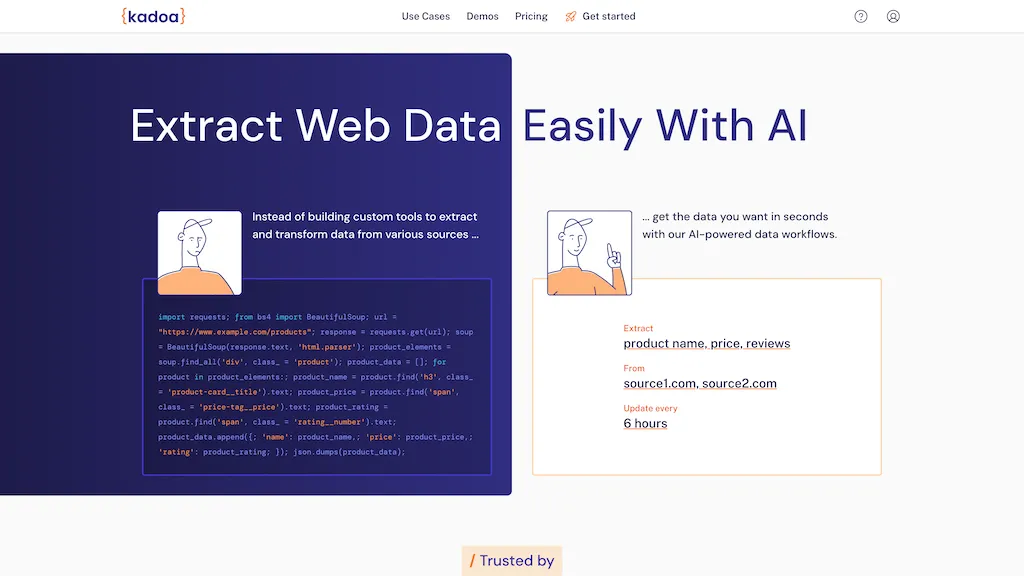What is Kadoa?
Kadoa is an AI-driven data extraction tool for the smooth extraction, processing, and transformation of data from various sources. The product was launched in 2021 and features customized rules and processing methods tailored for specific or individual applications. This product also provides an extended data visualization and reporting option that gives great allowance for users to understand and represent their data.
Kadoa Key Features & Benefits
Ease of Use:
Kadoa allows users to dive into the process of data extraction with the help of a drag-and-drop interface without knowledge of how to program their system.
Support for Diverse Data Sources:
The tool supports varied data source types like web pages, APIs, and databases, hence flexible to support the data extraction requirements.
Automation:
Kadoa is able to automate data extraction by setting rules to cut down on manual operations.
Data Analysis Tools:
Such tools allow performing various types of analyses, such as data visualization, distribution analysis, and correlation analysis.
Data Conversion:
Data can be converted into various formats, such as CSV, Excel, JSON, XML, and more.
Data Integration:
Kadoa integrates several data sources, which allows for the processing and analysis of data in it.
Data Mining Algorithms:
Available algorithms on data mining for clustering, classification, and association rule mining.
Use Cases and Applications of Kadoa
The versatility of Kadoa makes this an extremely useful tool to many industries, including but not limited to the following:
-
Finance:
With Kadoa, financial institutions can do market analysis, risk assessment, and investment analysis. It enhances predictive analytics with its machine learning algorithms in enhancing decision-making. -
Healthcare:
Kadoa can be used by medical institutions in the analysis of medical records for drug analysis and the prediction of diseases. Its machine learning capabilities aid medical research and diagnostics. -
Retail:
Kadoa can be used for analyzing sales trends and customer behavior, coupled with inventory management. It also hosts sales forecast and personalized recommendations using machine learning. -
Internet:
Internet companies can process user behavior data, analyze ad effectiveness, and optimize search engines. Kadoa’s machine learning algorithms help in personalized recommendations and content distribution. -
Manufacturing:
Production industries can be powered with Kadoa to monitor production, equipment fault diagnostics, and quality control. The predictive analytics in this tool can maximize production and forecasting.
How to Use Kadoa
Signing up with Kadoa is very easy:
-
Sign up:
Sign up for Kadoa’s platform. -
Choose data source:
You will have to choose the data source from which you wish to extract data. This can be a web page, API, or database. -
Extract Rules:
Modify the rules in a way that seems best for the data to be extracted. -
Automate Processes:
Leverage the automation feature to eliminate manual efforts in data extraction. -
Analyze Data:
Use their vast variety of available data analysis tools. -
Convert and Integrate:
Convert the extracted data to the format needed and integrate the extracted data with the rest of the data sources.
For more advanced customization regarding the setup of data extraction flows through the API, the Kadoa API documentation offers users detailed guidance.
How Kadoa Works
Kadoa makes use of advanced AI technologies such as smart navigation, Robotic Process Automation, and autonomous agents to identify, track down, and extract desired information from websites. It would be able to manage the most complex tasks such as clicking, scrolling, and even sustaining workflows whenever the source websites undergo changes. That kind of scalability ensures that millions of data records would be processed daily by organizations without losing speed and quality.
Pros and Cons of Kadoa
Like any other tool, Kadoa is not an exception in terms of having some limitations and dark sides. Among them are the following:
Pros:
- Very user-friendly interface
- Integrates with a great variety of data sources
- Automates extraction process
- In-depth data analysis and data visualization
- Scalability and reliability
Cons:
- Might need some time to adjust extraction rules in the more advanced setup
- Might require time and bringing a learning curve to non-technical users to exploit more complex features
Conclusion on Kadoa
In closing, Kadoa is a mighty and versatile data extraction tool made for most industries. An easy-to-use interface, automation, and robust data analysis tools drive this software to be among the best choices any organization will ever make to innovate their data workflows. It is expected that future developments and updates will only enhance its capabilities and user experience.
Kadoa FAQs
What data sources are supported by Kadoa?
It supports a variety of data sources, including web pages, APIs, and databases.
What conversions on data can Kadoa do?
Kadoa supports conversions on data to any desired format: CSV, Excel, JSON, XML, PDF, HTML, etc.
Is Kadoa scalable?
Definitely. Kadoa has been built to deal with enormous amounts of data in an efficient manner and is scalable for all organizational needs.
How easily Kadoa can be adapted into existing projects?
Kadoa comes with a well-documented API, cleaning extracted data to assist you in integrating the same into the existing projects and tools.










